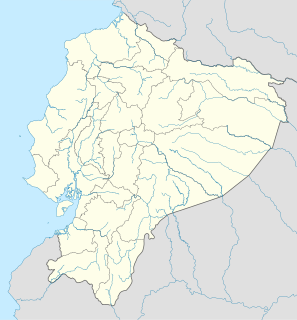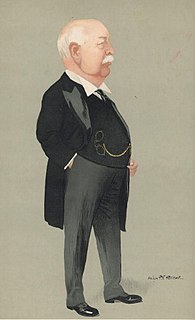
Club Social y Deportivo Macará is a professional football club based in Ambato, Ecuador. Their home stadium is Bellavista, which they share with city rivals Técnico Universitario.

Macará is a city in the Loja Province of Ecuador. It is the seat of the Macará Canton and is on the border between Ecuador and Peru.

G-protein-signaling modulator 2, also called LGN for its 10 Leucine-Glycine-Asparagine repeats, is a protein that in humans is encoded by the GPSM2 gene.

Partitioning defective 6 homolog beta is a protein that in humans is encoded by the PARD6B gene.

José María Velasco Ibarra Airport is an airport serving Macará, a city in the Loja Province of Ecuador. Macará is on Ecuador's border with Peru.

Macará Canton is a canton of Ecuador, located in the Loja Province. Its capital is the town of Macará. Its population at the 2001 census was 18,350.
Víctor Genes was a Paraguayan association football attacking midfielder. He played professional football in Paraguay for Cerro Porteño. He was the football manager of Paraguay from 2013 to 2014.
Macara is a genus of moths in the family Megalopygidae.
Liga Deportiva Universitaria de Quito's 2013 season was the club's 83rd year of existence, the 60th year in professional football, and the 52nd in the top level of professional football in Ecuador.

Michael Steveen Estrada Martínez is an Ecuadorian professional footballer who plays for Liga MX club Toluca and the Ecuador national team as a forward.
Ian G. Macara is a British-American biologist, currently the Louise B. McGavock Chair at Vanderbilt University. He received his PhD from the University of Sheffield in the United Kingdom and completed postdoctoral training at Harvard University before moving to the University of Virginia, where he was the Harrison Distinguished Professor of Microbiology and Director of the Advanced Microscopy Facility. He was named the chair of the Vanderbilt Department of Cell and Developmental Biology in 2012. His research focuses on the molecules that establish Cell polarity in Epithelium, both in normal cells and in cancer.

Macara alydda is a moth of the family Megalopygidae. It was described by Herbert Druce in 1887. It is found in Costa Rica and Napo Province, Ecuador. The habitat consists of montane cloud forests.
Macara argentea is a moth of the family Megalopygidae. It was described by Herbert Druce in 1897. It is found in Panama and Ecuador.
Macara dyari is a moth of the Megalopygidae family. It was described by Paul Dognin in 1914. It is found in Colombia.
Macara heinrichi is a moth of the family Megalopygidae. It was described by Walter Hopp in 1928. It is found in South America.
Macara interpunctosa is a moth of the Megalopygidae family. It was described by Paul Dognin in 1914.
Macara nigripes is a moth of the Megalopygidae family. It was described by Harrison Gray Dyar Jr. in 1909. It is found in Guyana and Honduras.
Macara purens is a moth of the Megalopygidae family. It was described by Schaus in 1905. It is found in French Guiana.
Macara terena is a moth of the Megalopygidae family. It was described by Paul Dognin in 1914. It is found in Colombia.

Sir Charles Wright Macara, 1st Baronet (1845–1929) was a British cotton spinner and textile industrialist.







